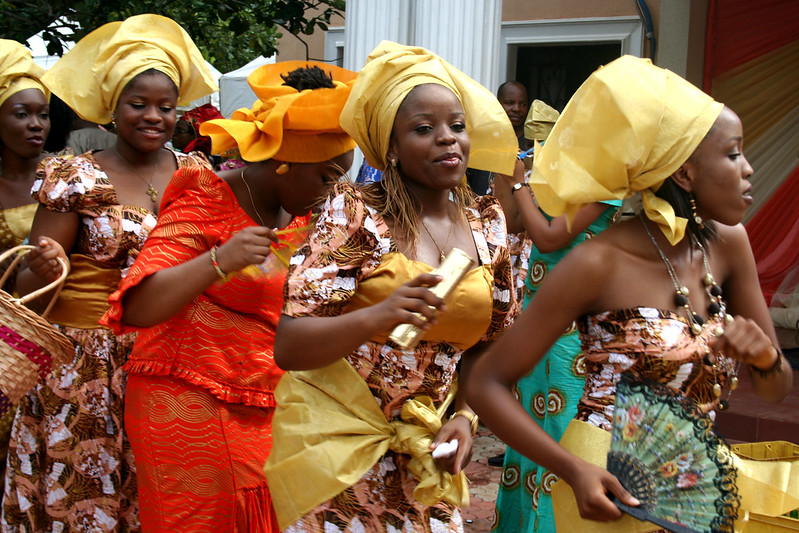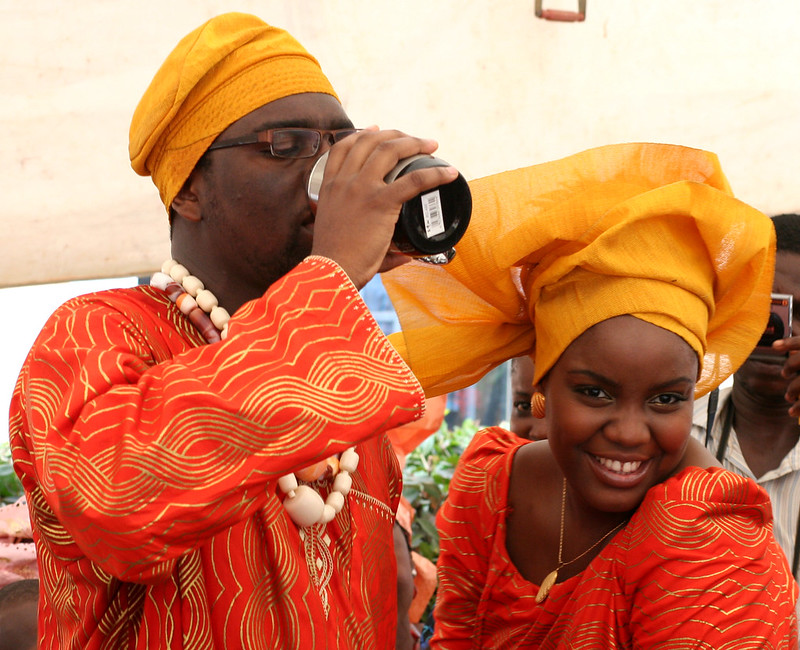Igbo Wedding
Igbo weddings in southeastern Nigeria begin with a proposal and multiple visits from the groom's family to negotiate and deliver the dowry. The ceremony ("igbankwu") includes the bride selling boiled eggs and the wine carrying ceremony ("igba nkwu nwanji"), where she finds and gives the groom palm wine to drink, signifying their marriage. Afterward, the couple has a church wedding, with the bride accompanied by her single friends in the "bride's train," and guests throwing money.
Igbo Wedding
Igbo people live in the southeast of Nigeria. Most of them are Christians. They speak Igbo language. There are about 32 millions of the Igbo.
The groom-to-be proposes the bride-to-be. If her answer is a positive one the groom, his parents and few close cousins visit the bride's family. The groom's dad will make a speech in which he will explain the reason why they arrived. The bride's father welcomes the guests. The bride arrives and officially excepts the proposal.
There is no wedding without determining the dowry ("ika-akalika"). On their second arrival the groom and his father give kola nuts and some palm wine to the bride's father. Then the negotiations begin. Usually some not so high amount of money is paid. Some food and drinks are given too. Yet another arrival is needed to actually deliver the money and other things agreed during negotiations. Then the wedding day is finally determined.
The wedding ("igbankwu") is held in the bride's home. Bride goes from guest to guest and sells boiled eggs. This tradition should show her talent in business.
What follows is the wine carrying ceremony ("igba nkwu nwanji"). The bride's father gives a cup ("iko") of palm wine to his daughter. In the meantime the groom leaves and mingles among guests. The bride then has to find him. She gives him the iko with palm wine. He drinks it. That way they are traditionally married.
The newlyweds dance and guests throw money around them. On some weddings guest can even put banknotes on the bride's and groom's forehead.

After traditional wedding the couple gets married in church. The bride does not enter the church on her own. She is joined by her single friends. This is called the "bride's train". People throw money on these women.

References
Igbo people
https://en.wikipedia.org/wiki/Igbo_people
Michael Widjaja,Traditional Family Ceremonies
http://www.igboguide.org/HT-chapter11.htm
Stella Anokam, The Igbo Traditional Marriage Ceremony: Stages and Custom (Groom's Guide)
http://naijaglamwedding.com/igbo-traditional-marriage-stages/
Oke Efagene, Traditional Marriage Rites - How it's done in Igbo land
http://pulse.ng/weddings/traditional-marriage-rites-how-its-done-in-igbo-land-id3447877.html
Image(s)
Igbo wedding train (photo by Jeremy Weate, Flickr)
https://www.flickr.com/photos/73542590@N00/3442661962/
Igbo groom drinking from a "iko" (photo by Jeremy Weate, Flickr)
https://www.flickr.com/photos/73542590@N00/3442077459/